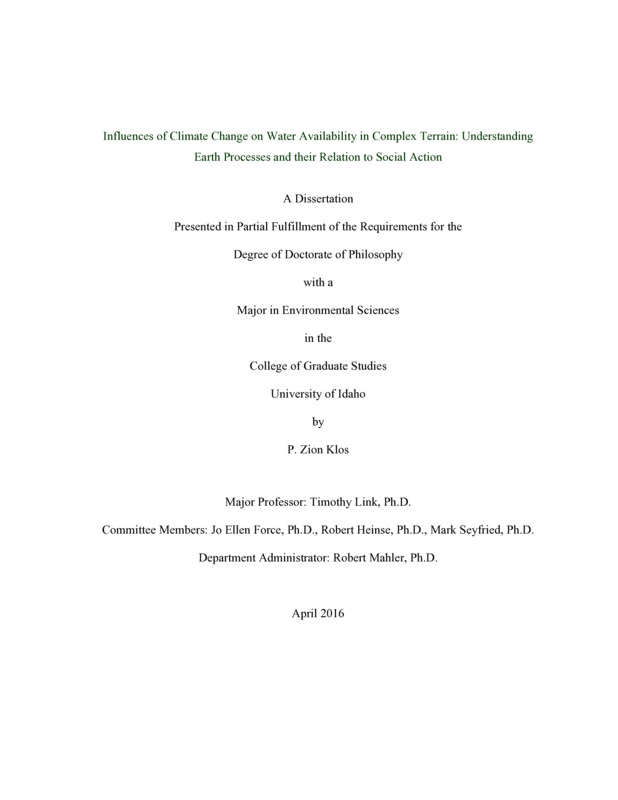Influences of Climate Change on Water Availability in Complex Terrain: Understanding Earth Processes and their Relation to Social Action
Klos, Peter Zion. (2016). Influences of Climate Change on Water Availability in Complex Terrain: Understanding Earth Processes and their Relation to Social Action. Theses and Dissertations Collection, University of Idaho Library Digital Collections. https://www.lib.uidaho.edu/digital/etd/items/klos_idaho_0089e_10857.html
- Title:
- Influences of Climate Change on Water Availability in Complex Terrain: Understanding Earth Processes and their Relation to Social Action
- Author:
- Klos, Peter Zion
- Date:
- 2016
- Program:
- Environmental Science
- Subject Category:
- Climate change; Communication; Hydrologic sciences
- Abstract:
-
Climate change and its hydrologic influences are well documented at the global scale, but local and regional changes are not as well understood. Chapter 2 describes an interdisciplinary framework that couples end users’ data needs with observed, biophysical changes. An online survey of natural resource professionals in Idaho was conducted to assess the perceived impacts from climate change and determine the biophysical data needed to measure those impacts. Guided by the survey results, 15 biophysical indicator datasets were summarized. Quantitative changes in indicators were determined using time series analysis from 1975 to 2010. Indicators displayed trends of varying likelihood over the analysis period. Chapter 3 moves beyond observations, and models the future extent of the rain-snow transition zone across the complex terrain of the western United States by the mid-21st century. These projections indicate a 30 percent decrease in areal extent of winter wet-day temperatures conducive to snowfall over the western United States. Chapter 4 explores the usefulness of these and other types of climate change science for federal resource managers, focusing on the efficacy of potential adaptation strategies and barriers limiting the use of climate change science in adaptation efforts. We interacted with 77 U.S. Forest Service and Bureau of Land Management personnel through surveys, semi-structured interviews, and four collaborative workshops at locations across Idaho and Montana. We used a mixed- methods approach to evaluate managers’ perceptions about adapting to and mitigating for climate change. Although resource managers incorporate general language about climate change in landscape-level planning documents, they are currently not planning on-the-ground adaptation or mitigation projects. Managers felt that their organizations were most likely to adapt to climate change through use of existing management strategies that are already widely implemented for other non-climate related management goals. Chapter 5 explores whether the boundary organization (workshops) and objects (climate change science products) used in the previous chapters were perceived as credible and useful. Perceived credibility and usefulness increased overall, and regional-scale hydrologic information was deemed most useful. We discuss the importance of uncertainty, visualization, and best practices for effective climate change deliberation at the research-management interface.
- Description:
- doctoral, Ph.D., Environmental Science -- University of Idaho - College of Graduate Studies, 2016
- Major Professor:
- Link, Timothy E
- Committee:
- Force, Jo Ellen; Heinse, Robert; Seyfried, Mark
- Defense Date:
- 2016
- Identifier:
- Klos_idaho_0089E_10857
- Type:
- Text
- Format Original:
- Format:
- application/pdf
- Rights:
- In Copyright - Educational Use Permitted. For more information, please contact University of Idaho Library Special Collections and Archives Department at libspec@uidaho.edu.
- Standardized Rights:
- http://rightsstatements.org/vocab/InC-EDU/1.0/

